So no, Henry IV didn't like the Welsh. More than usual for an English monarch, he really detested the Welsh. Especially here, at his first Parliament, where those who'd helped him secure his throne were all looking expectantly towards their rewards, and the nobility were anticipating something to ensure their ongoing loyalty.
The second strike against Owain Glyndŵr was that - as he argued his case with all the eloquence of a lawyer and life-long courtier - the counselor standing alongside Henry IV, advising him on his judgment, was Lord Grey of Ruthin.
Henry IV sneered out his verdict, "What care we for these barefoot Welsh doggis!"
Even then, Glyndŵr did not rise. The royal blood of Wales met in his veins - two ancient ruling families enjoined by the marriage of his parents rendering him the true Prince of Wales by birthright - but he grasped reality only too well. He knew the might that could crush him at the barest excuse. Thus he returned home and let it go.
He still had property, land and tenants aplenty, and for that reason, he was legally obliged to raise a militia force when King Henry gave the word. Weeks later, when a Scottish army invaded the north of England, such a decree went out. All over England and Wales, soldiers were raised for the king's cause, but not on Glyndŵr's estates.
He hadn't been given the message. Lord Grey made sure it was never passed on to him, in the full knowledge that his neighbor's no show would be viewed as treason, and his land and property would be forfeit. Grey himself had designs upon that.
When Owain Glyndŵr discovered what had been done to him, he knew that his life was already over. On a very personal level, he'd just lost all. As soon as Henry returned from the north, the order would be given and that would be the end of everything.
In short, Lord Grey left the true Prince of Wales with nothing left to lose. That's why Owain Glyndŵr rose up, not at first for Welsh independence, though that's what his Rising became.
On September 16th 1400, he was crowned Owain IV, Prince of Wales, in a quiet ceremony at Glyndyfrdwy. Then rode into Corwen to publicly announce his fact, and to spread the word that all Welshmen who would rise with him should muster there.
Two days later, on September 18th, nearly three hundred people swarmed into Ruthin, looted its rich stores, then burned the town to the ground. The Glyndŵr Rising had begun.







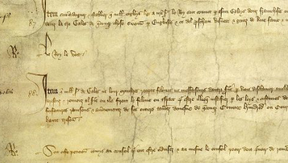 During the autumn of 1400, the Glyndŵr Rising had seen several English plantations attacked, looted and burned to the ground.
During the autumn of 1400, the Glyndŵr Rising had seen several English plantations attacked, looted and burned to the ground.







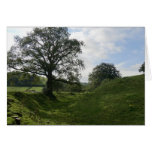
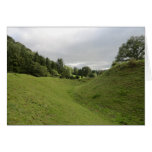






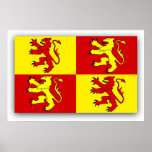




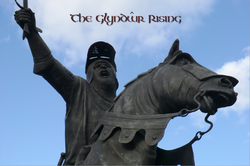

 St Tydecho's Churches in West Waleson 09/03/2014
St Tydecho's Churches in West Waleson 09/03/2014
 Goodies for an Outlander Premiere Partyon 03/06/2015
Goodies for an Outlander Premiere Partyon 03/06/2015
 Holocaust Memorial Day Interview with Rainer Höss, Grandson of Rudolf Architect of Auschwitzon 01/24/2015
Holocaust Memorial Day Interview with Rainer Höss, Grandson of Rudolf Architect of Auschwitzon 01/24/2015
 Romantic Valentine Gifts for an Outlander Fanon 01/16/2015
Romantic Valentine Gifts for an Outlander Fanon 01/16/2015

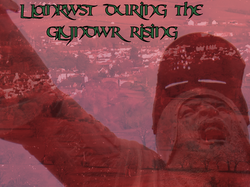
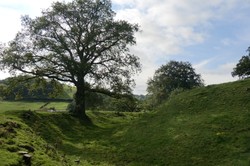
Comments
Frank - I'm glad that you thought so. It's a fascinating period in history. Heart-breaking too, on so many different levels. Not least because it's war, and such circumstances are always heart-breaking.
Ember - Ultimately it was a Welsh lack of confidence in their long-term ability to hold out against the English, plus Prince Hal changing strategy. Instead of rushing around like a blue-arsed fly, he concentrated all of his forces on one particular area. Then moved on to the next, once it was subdued.
Hal also played a clever game, whereby he targeted weak links in the chain first. Glamorgan and Usk being a biggie, as that was mostly populated by Flemish and Anglo-Norman settlers. It had been for generations too, since Iestyn surrendered territory in return for Norman mercenaries in his fight against another Welsh prince. Idiot.
The Flemish had much more faith in the English than the Welsh, as culturally they were more akin to the latter. They'd only temporarily sided with Owain when he became so strong and it seemed France was supporting him. But the French were pretty much trolling.
If you want to see angry Welsh taking vengeance, don't look to the British Isles. Turn your attention to just a few years on at Agincourt. Look what the Welsh bowmen did there against French knights and soldiers, who'd pretty much sold them up the Severn during the Rising.
Anyway, the French wavered; the Flemish caved in; and Welsh cantrefs toppled like dominoes, as each found themselves on the new front line - their borders suddenly neighbouring England with all the danger that entailed. It all happened so fast, gathering speed as each one fell.
But yes, if certain informants hadn't gone rushing from Harlech to Hal, then he wouldn't have panicked quite so much and set this chain of events in motion. The longer Owain held onto his country, the better his change of securing European allies, and the harder it would have been for England to invade without continental consequences. Just like Scotland and the Auld Alliance with France, which held both nations in such good stead for so long.
This was a detailed historical account that covers matters not widely known, and is thus very informative.
Yeah, I'll be waiting for it. I don't think it quite hit here so much as crossed my mind again, that this was probably a pretty close call in the end, especially as he really started to rally the people. Which I suppose poses the question what actually killed it in the end? If the people protected Owain, what actually just stopped an uprising of angry Welsh, regardless of whether they had a leader technically... Or maybe I'm not fully understanding what actually caused it to end? Though I know in a sense they never really did give up... I dunno, anyways.
This is the same one that had the spy amongst him when he made his announcement right? I got the impression that things would have gone massively different if even that had not happened. Or is that just one small aspect? Haha sorry I'll let you muse on the first question before I start asking a bunch of others XD
I'd be very, very happy to take you to Harlech for Glyndwr Day. :)
Yep, it's quite mind-blowing to consider that not one person gave him up, even with such wealth on offer, and particularly in view of the fact that the Welsh were subject to the Penal Laws at the time. It speaks volumes doesn't it? Not only of the hope afforded by Owain, but by the hatred in which Henry IV and Prince Hal were held.
That latter is such a big question, with a lot of variables. I'm going to have to muse on it for a while before I answer, if that's ok?
Oh man, I'd love to return to Harlech for Owain Glyndwr day.
I'd picked up a lot of this history just hanging out in Wales with you. Finally read this though! The bit at the end, which you may have actually mentioned, hadn't really hit in realization. That he was in hiding and was never given up, no matter what it might've been worth, that's so amazing, I don't even know how to describe it really. Wow.
How close was he to actually winning the uprising by the way. It seems like he did really well in general, like he/Wales might've actually succeeded had it not been for a few factors... Do you think this is true?